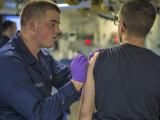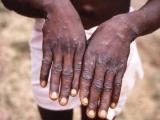Jun 5, 2007 (CIDRAP News) – US officials have announced the award of a $500 million contract to Bavarian Nordic A/S, a Danish firm, for 20 million doses of a smallpox vaccine that's expected to be safe for people with weakened immune systems.
Bavarian Nordic, based in Copenhagen, will produce its "next generation" smallpox vaccine, called Imvamune, for the Department of Health and Human Services (HHS), HHS Secretary Mike Leavitt announced in a news release yesterday. Imvamune is the company's version of modified vaccinia Ankara (MVA).
HHS has stockpiled enough conventional smallpox vaccine to protect the entire US population in the event of a release of smallpox by terrorists. But the conventional vaccine uses live vaccinia virus, a cousin of the smallpox virus, and it can cause rare but potentially life-threatening side effects. People who have HIV or are being treated with chemotherapy should not receive the conventional vaccine except in emergencies, HHS said.
MVA contains a form of vaccinia virus that has been weakened so that it can't replicate in humans, the agency said. Officials expect that it could be used safely in the estimated 10 million Americans who have limited immunity. The vaccine is being tested with a two-dose immunization schedule.
"Acquiring a stockpile of this new smallpox vaccine is a key step toward protecting even more members of the American public against a smallpox release," Leavitt commented.
Bavarian Nordic announced in April that it expected to win the HHS contract, but HHS said then that no decision had been made yet. Bavarian Nordic and the British drug company Acambis each received an HHS contract in early 2003 to develop and test a vaccine based on MVA. In September 2004 HHS awarded each company a further contract calling for production of 500,000 doses of the vaccine and clinical trials. But Acambis announced in November 2006 that HHS had decided that the company's vaccine was too expensive.
HHS said the contract was awarded under Project BioShield, a federal program launched in 2004 to develop medical countermeasures for chemical, biological, and other unconventional weapons. The contract allows for the agency to make two kinds of payments before delivery of the product.
Under the original BioShield legislation, HHS can make an advance payment on the basis of a finding that it is necessary to the success of the product. Under the Pandemic and All-Hazards Preparedness Act of 2006, the company can be paid for reaching certain milestones in development, HHS reported.
In a news release, Bavarian Nordic said advance and milestone payments in the contract total $150 million, of which $125 million is to be paid in 2007 and 2008. The company said this is the first time any company will have received advance payments under the BioShield program.
The contract includes options that may bring its total value to $1.6 billion, according to Bavarian Nordic. Besides covering production of the vaccine, the base contract of $500 million covers additional work to meet requirements for use of the vaccine in an emergency, plus nonclinical and clinical studies necessary to obtain a Food and Drug Administration license (FDA) for it, the company said.
Options in the contract, amounting to $1.1 billion, include delivery of up to 60 million more doses of the vaccine, plus further clinical studies to extend the FDA license to include people infected with HIV, children, and the elderly, the company said.
Dr. Paul Chaplain, Bavarian Nordic's executive vice president and chief scientific officer, noted that HHS has a policy permitting the emergency use of medical products not yet licensed by the FDA, provided they meet certain criteria. To meet those criteria, the company must generate safety data from trials of the vaccine in healthy people and at-risk groups such as HIV patients, demonstrate a validated manufacturing process, and have some efficacy data, he told CIDRAP News.
"And in fact we have most of that data already," Chaplain said. The company has tested the vaccine in about 1,500 people, including healthy people and at-risk groups, and has published data on the vaccine's efficacy in monkeys and other animals, he said.
Chaplain said the company is capable of making 40 million doses of the vaccine annually and could potentially start delivering doses to HHS immediately. But because the firm first must provide all the data to support emergency use of the vaccine, it expects to start delivering it toward the end of next year, he said.
Chaplain also said the company expects to start filing its application for an FDA license in 2009 and complete the filing process in 2010. Phase 2 studies are approaching completion, and plans call for meeting with the FDA later this year to discuss phase 3 studies, with an expectation to launch them next year, he added.
HHS said phase 1 studies supported by the National Institutes of Health in 2003 showed that MVA vaccine was safe and stimulated an immune response in healthy volunteers. The agency also has said an MVA-based vaccine was found to be safe when it was given to 120,000 Germans in the 1970s. But research on MVA ended when smallpox was declared eradicated in 1980.
Although smallpox was eradicated, disease experts fear that terrorists may have supplies of the virus, which the Soviet Union made in large quantities during the Cold War. The United States and Russia still hold samples of the smallpox virus for research purposes.
See also:
Jun 4 HHS news release
http://www.hhs.gov/news/press/2007pres/06/20070604a.html
Jun 4 Bavarian Nordic news release
http://www.bavarian-nordic.com/investor/announcements/2007-23.aspx
Apr 18 CIDRAP News story "Danish firm expects to sell smallpox vaccine to US"
http://www.cidrap.umn.edu/cidrap/content/bt/smallpox/news/apr1807smallpox.html




















